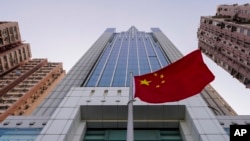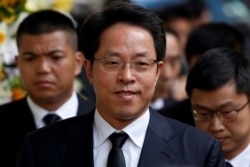China Thursday replaced the head of its office responsible for Hong Kong affairs with a hardliner known for his campaign of demolition of Christian crosses on churches -- a move analysts say indicates further tightening of its control over the semi-autonomous city.
Xia Baolong, a close ally of Chinese President Xi Jinping, will replace Zhang Xiaoming as director of the Hong Kong and Macau Affairs Office, or China’s top representative in Hong Kong, according to a short statement on the Chinese government portal. The move came after months of anti-government protests roiled the financial hub and amid rising tensions over the coronavirus epidemic.
The statement said Zhang was being transferred to an administrative post within the same office under the State Council, but his ministerial ranking has remained. Zhang has become the highest Beijing-appointed official to be removed from his job in the wake of protests sparked by a controversial extradition bill which would have allowed individuals in Hong Kong to be sent to China for trials.
Xia, 67, was notorious for his order of the demolition of crosses and underground Christian churches across the eastern province of Zhejiang in 2014 while he was its top leader. His campaign came after Xi stepped up ideological control across the nation in 2013 -- an internal document known as Document No 9 ordered Communist party cadres to tackle seven supposedly subversive influences on society, including press freedom, “universal values” of human rights, and civil rights. He was Xi’s deputy when Xi was Zhejiang’s party’s secretary from 2003 to 2007.
Analysts say Xia has a track record of closely following his former boss’s orders and believe he would also execute the Chinese government’s desire to further tighten its grip over Hong Kong.
Joseph Cheng, a retired political scientist at the City University of Hong Kong, said the replacement of Zhang with a hardliner with a track record of eagerness to please the top does not indicate any policy change toward Hong Kong.
“It is in line with its policy of supporting Carrie Lam’s [hardline] policy,” he said, referring to Hong Kong’s unpopular leader, who has been much criticized for her eagerness to execute Beijing’s orders on repressing Hong Kong’s freedoms. “It is unsettling… I can’t see any policy change.”
Johnny Lau, a veteran commentator on Chinese politics, said China’s policy toward Hong Kong has been met with strong pushback amid the recent political crisis and the authorities were only making a political gesture by removing some officials.
“It is just shifting the blame on the people below,” he said. “I can’t see how a change of personnel would make things better,” he said.
Xi Jinping's policy on Hong Kong
Ying Fuk Tsang, the director of the divinity school at the Chinese University of Hong Kong, said the appointment of Xi’s loyalist “reflects that Xi Jinping will comprehensively step up China’s control over Hong Kong to bolster its governance.”
China spelled out its intention to bring Hong Kong under tighter control in November.
A communique issued after the Fourth Plenum, a key Communist Party meeting, said “One country” should override “Two systems” in the policy that has granted Hong Kong extensive autonomy since the handover from British colonial rule. It said it would not tolerate actions that “split the country” and told Hong Kong officials to “perfect its legal system to safeguard national security” and step up on “patriotic education” in the city.
Ying added that given Xia’s 2014 campaign which pulled down over 1,200 crosses from churches in Zhejiang, a province known for its strong Christian presence, it was likely that Xia would also take aim at Hong Kong’s civil society, including Christian churches.
Outspoken Christian leaders in Hong Kong have been accused by China’s state media for its links with “foreign hostile forces” in the anti-extradition movement.






